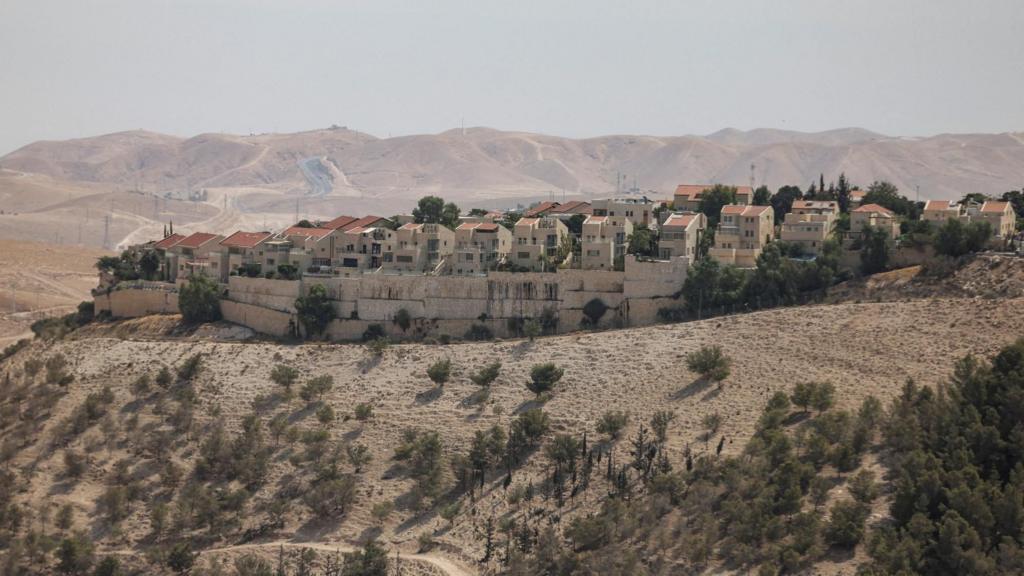“`html
The United Arab Emirates has cautioned Israel that any annexation of the occupied West Bank would represent a “red line,” potentially jeopardizing the Abraham Accords that facilitated the normalization of relations between the two nations.
Lana Nusseibeh, a senior Emirati official, stated that such an action would effectively dismantle the two-state solution to the enduring Israeli-Palestinian conflict.
The Palestinian Authority’s foreign ministry has expressed its support for the UAE’s stance.
While the Israeli government has yet to issue a formal response, Nusseibeh’s remarks follow a proposal by Finance Minister Bezalel Smotrich, a prominent figure on the far-right, to annex approximately four-fifths of the West Bank.
Since occupying the West Bank and East Jerusalem during the 1967 Middle East war, Israel has established approximately 160 settlements, housing an estimated 700,000 Jewish residents. These territories are claimed by Palestinians, along with Gaza, as part of their vision for a future independent state. An estimated 3.3 million Palestinians reside in the West Bank alongside the settlers.
The establishment of these settlements is widely regarded as illegal under international law.
The Abraham Accords, brokered by the United States in 2020, led to the establishment of full diplomatic relations between Israel and the UAE, Bahrain, and Morocco.
A key condition set by the UAE for signing the Accords was the cessation of plans by then-Prime Minister Benjamin Netanyahu’s government to annex parts of the West Bank, including settlements and the Jordan Valley. At the time, Netanyahu stated that he had agreed to “suspend” the plans, but emphasized that they remained “on the table.”
Many ministers within his current right-wing and pro-settler governing coalition have long advocated for the annexation of part or all of the West Bank. However, reports indicate that they have been debating whether to advance such plans in response to recent announcements by the UK, France, and other countries that they intend to recognize the State of Palestine this month.
Netanyahu has asserted that recognizing Palestinian statehood in the aftermath of the Hamas attack on Israel on October 7, 2023, which precipitated the conflict in Gaza, would be tantamount to “a reward for terrorism.”
The UAE is among the 147 UN member states that already recognize the State of Palestine.
“From the very beginning, we viewed the [Abraham] Accords as a way to enable our continued support for the Palestinian people and their legitimate aspiration for an independent state,” stated Nusseibeh, the UAE foreign ministry’s assistant minister for political affairs.
She added: “Annexation in the West Bank would constitute a red line for the UAE.”
“It would severely undermine the vision and spirit of [the] Accords, end the pursuit of regional integration and would alter the widely shared consensus on what the trajectory of this conflict should be – two states living side by side in peace, prosperity and security.”
Earlier in the day, Smotrich, an ultranationalist leader and settler with authority over planning in the West Bank, declared at a news conference in Jerusalem that “the time has come” for annexation.
“The idea of dividing the country and establishing a terrorist state at its centre must be put off the table once and for all,” he asserted.
He presented a map that he claimed illustrated a proposal from the defense ministry’s settlement administration for “applying Israeli sovereignty” to approximately 82% of the territory, which he argued was in line with the principle of “maximum land with minimum Arabs.”
The remaining 18% of the territory was depicted as isolated enclaves surrounding six Palestinian cities: Jenin, Tulkarm, Nablus, Ramallah, Jericho, and Hebron.
Bethlehem was among the numerous other Palestinian cities, towns, and villages excluded from the proposed annexation. East Jerusalem was already annexed by Israel in 1980, a move that remains unrecognized by the vast majority of the international community.
Smotrich stated that Palestinians would “continue to manage their own lives, in the immediate future in the same way that this is done today through the Palestinian Authority, and later through regional civilian management alternatives.”
The PA, which governs areas of the West Bank not under full Israeli control, condemned Smotrich’s plan as a “direct threat” to hopes for a Palestinian state.
Yehuda Shaul of the Ofek Centre, a think tank advocating for an end to Israel’s occupation, reposted Smotrich’s map on X, commenting: “Reminds me of another map in a different continent, from the 20th Century. There is a word in Afrikaans to describe that regime.”
Several international human rights organizations have concluded that Israel is already implementing an apartheid system in the West Bank, a characterization that the Israeli government has refuted.
Last month, the Israeli government’s approval of plans unveiled by Smotrich for a major settlement project in the E1 area, which would effectively sever the West Bank from East Jerusalem and divide the territory in two, sparked widespread international condemnation.
In 2024, the International Court of Justice issued an advisory opinion stating that Israel’s “continued presence in the Occupied Palestinian Territory is unlawful” and that the country was “under an obligation to bring to an end its unlawful presence… as rapidly as possible.”
Netanyahu responded at the time by dismissing the court’s opinion as a “decision of lies.”
Prime Minister Netanyahu says Hamas “has nothing new” and that war can end only on terms that Israel has set.
Strikes reportedly kill 31 people in the city, home to a million people and where a famine was declared last month.
The two democratic allies have had a spectacular falling out – but what has actually changed?
Ground forces are already pushing into the city, where hospitals say more than 50 people were killed by Israeli strikes on Tuesday.
Palestine Action was proscribed by the government but some campaigners argue the ban breaches the right to free speech.
“`

